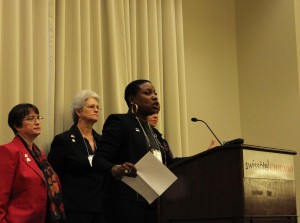
On the same day Congress passed the renewal of the Violence Against Women Act (VAWA) in February, three women were brutally murdered by a domestic partner in the United States. One of these women was five months pregnant and her two children sat in the car as their father burned her body, said Kim Gandy, president and chief executive officer of the National Network to End Domestic Violence.
“That made it a very average day in this country,” Gandy said. According to the National Institute of Justice and The Centers for Disease Control and Prevention, one in four women are affected by domestic violence every day in this country.
Gandy painted a vivid picture of domestic violence on Wednesday at an awareness brunch in downtown Chicago that was hosted by the Illinois Coalition Against Domestic Violence (ICADV) and the Allstate Foundation.
Vickie Smith, chief executive officer of the ICADV, said government appropriations have always been the largest source of operating funds for domestic violence programs.
Government funding cuts are two-fold: the 2012 fiscal year sequester, which was a result of the 2011 Budget Control Act, and the Oct. 1 government shutdown that occurred as a result of the 2014 fiscal year budget not being approved.
“The situation going on in D.C. is affecting us directly,” Smith said.
ICADV works to reduce domestic violence incidents statewide through various programs, but Smith said limited resources continue to present challenges.
Gandy said local, state and federal cuts with the sequester hit hard and many shelters are closing doors.
Funding totaling $20 million was taken out of domestic violence programs and support over the past fiscal year because of mandated budget cuts from the 2011 Budget Control Act, according to The Justice Department’s Office on Violence Against Women.
Gandy said domestic violence organizations used up their funding in reserve waiting on the sequester, leaving them with no additional funds on hand when the government shutdown hit.
And ICADV said limited resources led to turning away 10,000 adults and children seeking shelter last year.
Staffing reductions cut the agency’s manpower in half, which resulted in a revision to the shelter’s eligibility criteria. ICADV said that of the domestic violence survivors served, only 9 percent received emergency shelter or transitional housing.
“Domestic violence emergency services save lives,” Smith said.
ICADV survivors and staff members aren’t the only ones burdened with budget cuts.
“The leaders of the Rainbow House have not been paid in almost a month,” said Kathleen Higgins, the executive director of The Rainbow House. “I’m looking at about $20,000 worth of bills that I need to pay. We received a $6,000 grant from The Dominican Sisters organization, which is great, but I don’t know what to pay first since there is so much debt.”
This isn’t a new occurrence as Higgins said, “The government, for the last three years, has been seven to nine months late in allocating our funds.”
Despite late payments and limited resources, ICADV, which served more than 52,000 adults and children last year, announced its continuing partnership and programing efforts in the fight against domestic violence.

Also, ICADV will continue to provide services that include initial support, such as emotional counseling, and continued support, including career readiness programming.
“Public education is the most important step,” Smith said.
Smith said ICADV will partner with the Lt. Governor’s office again to hold its Verizon Wireless sponsored “No More Dating Abuse” video competition. In this competition, high school students statewide can submit a video calling for an end to teen dating abuse and promote healthy relationships.
Although ICADV does not partner with The Allstate Foundation, Smith recognized its Purple Purse finance independence program, which raised $350,000 for the YWCA this year.
Additionally, ICADV’s Virtual Legal Consult program allows shelters to offer remote legal counsel for domestic violence survivors. The shelters provide a computer and private rooms for individuals to Skype with an attorney, obtain legal consult and receive up to an hour of counsel.
“The process is really simple,” Smith said. “As long as the agency has a computer with a camera, they can discuss whatever issues that seem important.”
Smith said this tool can change the victims thought process by answering basic questions.
While these efforts provide help for survivors, prevention of domestic violence remains.
“We all want to be out of a job, but unfortunately we all have much more work to do,” Smith said.
Jasmine Browley and Christa Smith contributed to this story.








Be First to Comment